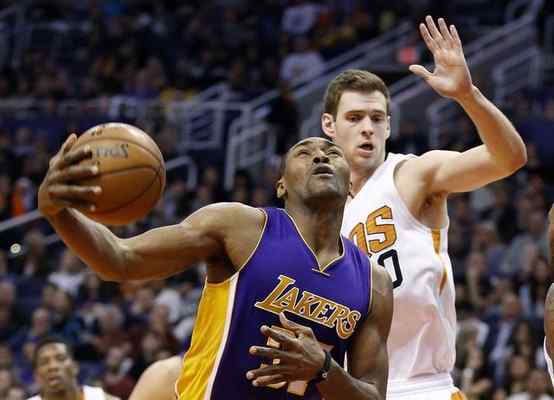
Metta World Peace, left, gets fouled Monday as Phoenix Suns’ Jon Leuer, right, defends. (AP Photo/Ross D. Franklin)
Below is an edited transcript of part 2 of my Q&A with Lakers veteran forward Metta World Peace, who talked in depth in a recent lunch interview with Los Angeles News Group. The second part of World Peace’s interview touches on the good and the bad the former Ron Artest experienced under former Lakers coach Phil Jackson, his take on Mike D’Antoni’s system, Kobe Bryant’s trust in his leadership and Julius Randle’s development.
With your interest in coaching, have you talked to Phil Jackson at all?
World Peace: “I haven’t talked to Phil in the last six months. But when I was in China [playing overseas], I talked to Phil the most. I talk to him about the game a lot. It’ll be about the game. I would call Phil and I would ask him how to beat the zone [defense]. In China, we also had some bad players. So I asked him, ‘How do you work with players that aren’t that good?’ It’s all about the positions you put them in and if you can help them succeed. So I talk to Phil about a lot of things.”
How about coaching?
World Peace: “I haven’t talked to him about coaching. I never did. But I know what I want to do when I coach. I exactly what I want to do.”
What’s that?
World Peace: “I can’t tell you.” (laughs)
Why not?
World Peace: “I just can’t tell you. But I know exactly how I want to play. I can’t leak it out. I can’t tell everybody how I’m going to do it.”
You mean regarding your system and philosophy?
World Peace: “Yeah.”
Would you ever use the triangle?
World Peace: “The triangle [offense] is hard. It’s not easy. But there’s things you can implement. Everybody does that. Golden State and San Antonio does that. Golden State has Steve Kerr and they run a little bit of triangle. The Spurs run a little bit. [Gregg] Popovich reminds me of Phil and [Rick] Carlisle. He dictates a lot [of plays], but then he lets you go. Carlisle has his own style. Popovich has his own style. But he reminds me of Phil and Carlisle together.”
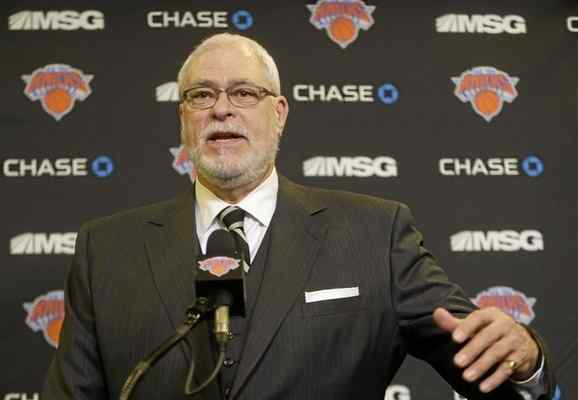
Former Lakers coach and Knicks president Phil Jackson often needled the former Ron Artest. Frank Franklin II/The Associated Press
What did you learn from Phil?
World Peace: “Phil taught me patience. I had the best combination. I had Phil and Mitch [Kupchak]. I was frustrated one day my first year [in 2009-10] and Mitch said, ‘Patience is a virtue.’ I was struggling at one point. He said, ‘Patience is a virtue.’ I listened to them and looked at the words. I thought, ‘Wow.’ I understood what he was saying. My time is going to come.'”
As much as you had expressed frustration with Phil needling you, did you think it was effective?
World Peace: “It was. First off, I was on a team where I couldn’t do what I could in Indiana. Right before I was suspended, I was averaging 24 points. After that, I got back to Sacramento and was averaging 20 points. Then, that playoffs, I was averaging 22 in the playoffs of that series. Now that I’m with the Lakers, my average went down to around 11 [points]. The team that Phil had, Kobe [Bryant] was going to do his thing. Then Pau [Gasol]. And then [Andrew] Bynum. I was totally the last option.
That was tough. I had to play a different role. Phil kept me in that role. He didn’t let me come out of that role. It was tough. I wanted to do what I wanted to do sometimes. So I learned a lot learning to be the role player. I learned a lot. I saw it from both sides from being the man to being a role player.”
When Phil coached you, he often critiqued your understanding of the triangle offense, your shooting percentage, your shot selection and even joking that your Peak shoes contributed to your foot injury. How did you handle that?
World Peace: “The shoes thing really frustrated me. I’m trying to grow a brand, and this guy is killing my brand. That was really frustrating. I got so mad at him one day. We’d be in practices some days where me and Phil would be going at it. He would say something to me. I would say something back to him. Phil is the only coach I could do that with where I could get in an argument without him taking it personally. I’ve seen a lot of people get into arguments with Phil. But he never took it personally.”
Did he want that confrontation?
World Peace: “I don’t know. But I got in Phil’s face one day. I was like, ‘Mother(expletive), expletive you!’ I think he liked when we let stuff out, but not in a way that would hurt the team. One time he pulled me up to the office and said, ‘Enough is enough.’
But Phil was great. I think sometimes he understood us where we were coming from. But I’ve seen some people who couldn’t handle that. Some coaches can’t handle a player talking back. At some point, it has to stop. But Phil would definitely push your buttons. He likes to get under your skin, so I think he wants to give you some leeway to get upset.”
Would you use any of those tactics as a coach?
World Peace: “We’re different. Phil definitely had an influence on me with the whole Zen (bleep) [laughs]. I’m not going to lie. I’m definitely into it. But I would never try to duplicate what he’s done. But he helped me out tremendously. I converted to Buddhism for a little bit. A little bit. I study Buddhism,. He definitely helped me a lot in helping me control myself. It takes time. For somebody like me, Phil was a blessing. Absolutely.”
How would you coach a player like yourself during your prime?
World Peace: “(Bleep) Probably with some suspensions (laughs). I’m not going to lie. I would’ve had to suspend me. Absolutely. I was wreckless. I was wreckless! When you get suspended, it’s not fun. You lose a lot of money. But what can you do. I was wreckless.”
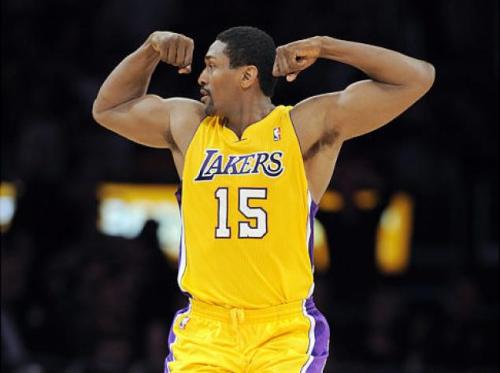
Former Lakers forward Metta World Peace has frequently worked out this summer at the Lakers’ practice facility in El Segundo.
So how have you changed?
World Peace: “I don’t know if I’ve changed. I’m more understanding. Corliss Williamson told me in Sacramento, ‘I didn’t know Ron Artest had leadership skills.’ That’s one of the guys I look up to. He’s one guy I idolize. I respect him a lot. The ultimate professional. I respect him. If I had to choose one guy I respect the most out of my whole career, it probably would be Corliss. He was the one true vet. I had Reggie Miller as a vet. But I was so wreckless at that time. Reggie couldn’t get through to me. But when I met Corliss, I was a little bit more stable. I was seeing a psychologist and things like that.
So I was able to absorb more and listen to Corliss. Not just listen o him off the court I benefited more from playing with Corliss and where I was at in my career and what I was trying to get to. So I saw everything. I listened to him all the time. Then on the court, he was so smart. We would practice. When I got there that year, I said we were going to get to the playoffs, everybody laughed, All the media laughed. But we went to the playoffs. We were in practice everyday going through the defense. Corliss was a major part of that in not giving up.”
Would you adopt anything you learned from Fran Fraschilla at St. John’s?
World Peace: “Fraschilla is amazing. Out of every coach I ever had, there’s differences between everybody. But he’s probably the best X’s and O’s coach I ever played for.”
How so?
World Peace: “He is focused on everything from your body to weight training to on the court to the plays and to the intensity. Everything is important to him. This guy is crazy. I’m telling you. This guy was intense. Ask any player who played for him. Practice was intense. His training camp was tougher than [Byron] Scott’s training camp by about 30 percent.”
How?
World Peace: “He was tough. He mentally pushed you to the edge. I felt like I was going to die. That was the only time in basketball where I felt like I might die. It was exhausting. He pushed you. But he helped me individually. There were things he taught me back then that I still do to this day, certain drills that he taught me back then. Some of them are curls and starting in close [to the basket] and then moving out.
There are a lot of great high intensity drills. Some guys work on their game, but they don’t have high intensity drills. So when you play a game, you have somebody like me guarding you and if you’re not working on your game at high intensity, you really don’t have a shot. Fran did a lot of that. Everything was very detailed. He was very good.”
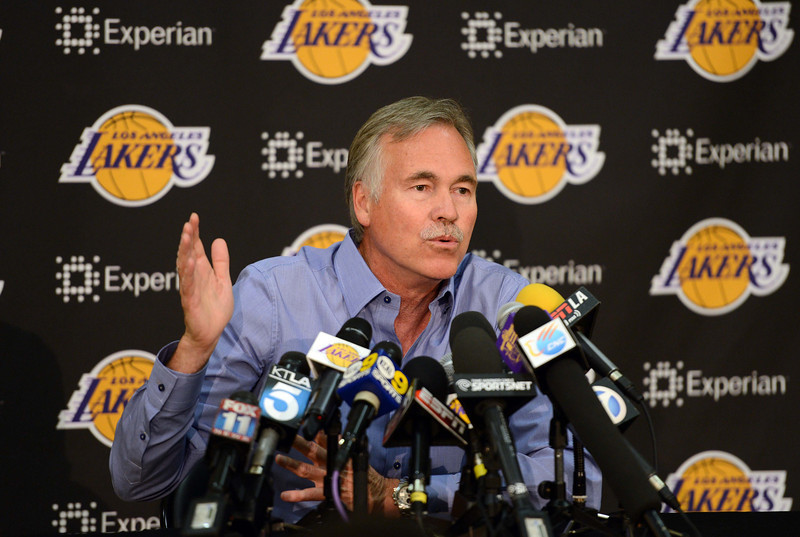
Former Los Angeles Lakers head coach Mike D’Antoni during a press conference held at the Toyota Sports Center, El Segundo Calif., Friday, April 18, 2014.
(Photo by Stephen Carr / Daily Breeze)
What about Mike D’Antoni? You learn anything from them?
World Peace: “I learned stuff from Mike D’Antoni. I kind of understood his ball movement concept and his high powered offense concept. That was fun. I like that. That’s something I could definitely take with me one day. Some of his concepts I definitely like, absolutely. But he didn’t have the team he needed to be successful [with the Lakers].
Yeah, what did you make of that dynamic? That year was interesting where most of the fanbase wanted Phil back. Pau [Gasol] and Dwight [Howard] don’t like Mike’s system. [Steve] Nash is trying to make it work. And Kobe is playing out of his mind before he got hurt. Where was the disconnect?
World Peace: “I don’t think the system was for Kobe, and Kobe wasn’t for the system. Somebody wasn’t giving in. The system that Mike D’Antoni put in was a Golden State Warriors system. The Warriors would have been great under D’Antoni. It’s all about ball movement. You have a player in [Stephen] Curry who can move off the ball. He doesn’t mind moving off the ball. But Kobe is an on-the-ball player. He can shoot off-the-ball. But he doesn’t move off the ball for 48 minutes. He wants that ball in his hands. That’s what he does.
There was no medium between the D’Antoni offense and what Kobe brings to the table. It was one or the other. Then, some of the players never played in a system like that. So he maybe could have slowly brought his system into play. It wasn’t comfortable moving off the ball, cutting and shooting a lot of 3’s. That team was more built to wear people out in the post. Kobe posted up. I posted up. Pau posted up. Antawn Jamison posted up. We’re a type of team that could wear you out, wear you out, wear you out. It was hard to adjust. But the system is great. I love it. Everybody gets a chance. It was equal opportunity. That’s how the game should be played. D’Antoni was right on par with the system.”
And Mike Brown?
World Peace: “When he was here, the offense was with [assistant] Eddie Jordan. It was Princeton. It’s a great offense. I would use some of those things.
Really? He got fired five games in his second season.
World Peace: “I know that’s what I was going to say. The Princeton offense is weird. It will put the superstar player off the ball at times we don’t need that superstar player off the ball. At times with the Princeton offense, it would put Kobe away for an entire game. It’s the right way to play if you have the right type of team. But when you have a superstar, you can’t put Kobe in that situation. You need him. He brings a lot to the table. He has heart. He’s hit 36 game winners. So you want Kobe to be in rhythm so at the end of the game, he can win the game.
If it was any other player, I would be okay with it. But with Kobe, you have to make adjustments. The triangle adjusted to Kobe. How many players were as clutch as Kobe? You have to make adjustments to a guy like that. 36 game winners, that’s unheard of. I have only one game winner. Actually, I had two game winners. I had one in Houston [2009-10]. I’m talking about when there’s no time on the clock. I hit some clutch shots. There was no time on the clock against Phoenix [in the 2010 NBA playoffs], but that was a lucky layup off the backboard. But Kobe had 36 game winners. You have to adjust to somebody like that.”
Did you talk to either Mikes about coaching then or now?
World Peace: “No, we were just trying to win games then. That’s the last thing on my mind. I wasn’t thinking about coaching. I was still playing.”
Would you use analytics?
World Peace: “I’m using analytics. Absolutely. Analytics is simple. You read it. Then you fix the problem. You don’t have to complicate it. I love analytics.”
Why did you say in New York that you hate analytics?
World Peace: “I didn’t understand it then. I understand it now.”
[At the time, the server at a vegan restaurant brought out World Peace’s meal, which included seaweed soup, stuffed avocado, a lentil burger and a sugar-free brownie]
Are your teammates emulating your diet habits?
World Peace: “Sometimes the guys will listen. Tim [DiFrancesco] is pretty good [the Lakers’ strength and conditioning coach]. He’s telling you how to eat. Brandon Bass is really healthy. But a lot of the young guys are still on fast food. But when you play professional sports, you have to take care of your body. People see how I eat and how I bring my veggies to the game and on the bus. I have energy. I’m 36 and years ago people said I was old. I’m still doing it.”
When did you stop drinking alcohol?
World Peace: “I stopped drinking a while ago. I drink heavy in the summer time three times. I give myself three hard party days. I save it for the summer time. Then the rest of the year, I’m not drinking. I stopped drinking in Jan. 2010.”
What did that do for you?
World Peace: “If it wasn’t for my meniscus tear [in 2013], I would say I could play until I was 40. If I really wanted to, I could probably play until abou t40. I’m just playing off the ball and playing hard. I could do that until I’m 40 years old.”
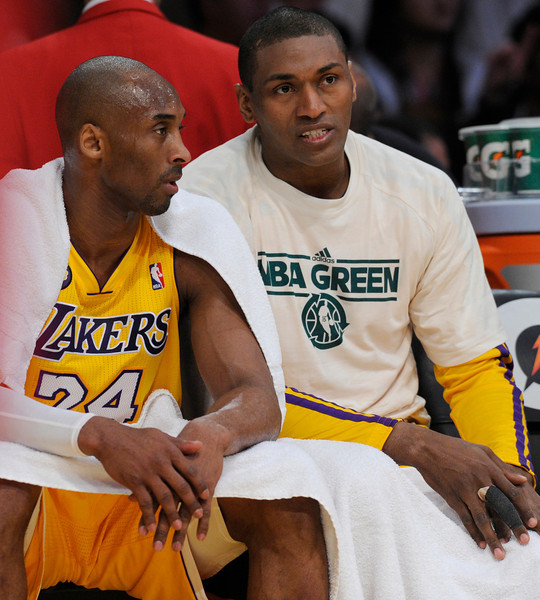 How do you and Kobe handle the leadership role?
How do you and Kobe handle the leadership role?
World Peace: “We’re both highly intense in different ways. Kobe is more on the court and he’s showing you through his history and the Washington game. If you’ve seen that and on his team, if you want to be that good, you have to put that type of work in. So Kobe’s more by example on the court. I’m more in the locker room every day preaching the message, ‘Team, ‘Team, ‘Team,’ until they get it. I say the same thing every day. We share it like that. But I stay out of his way. When he talks, I shut up.”
But you’re pretty involved with developing Julius Randle. Where is he in his development?
World Peace: “I want him to hit more jumpers. I want to see him expand his game with his dribbling, 3-point shooting and post-ups. I want to see him improve on everything. This year, I want to see him make improvement on everything. But he had 19 rebounds [against Washington]. I got on him one day in the locker room. He was probably surprised.
We talk a lot and I’m usually nice. He never heard me be mean. I told him, ‘Rebound the [expletive] ball. What the [expletive] are you doing? But he understands I come from a good place. With the Knicks, it was hard. They thought I was crazy. But if I say, rebound the ball and be nice, they might not respect that. If I say to rebound the [expletive] ball, you might respect that. Julius did.”
In the 2012-13 season, Kobe called on you to be more of a vocal leader because of your role in 2010 title run and his respect for you. But you said at the time that you felt uncomfortable doing that. Why?
World Peace: “It was a process. But the thing is this, we had Dwight. He wanted to be a leader. If you want to be a leader, go for it. Kobe wanted me to speak more. But Dwight wanted to be in that role.”
So were you trying to be respectful to Dwight?
World Peace: “I was just trying to be courteous. But I should’ve pulled Dwight to the side and said, ‘This is how we’re going to do things here with me being an older vet. I know you’re a superstar, but I’m going to try to have a voice as much as possible. I was trying to be courteous because Dwight really wanted to be a leader on the team. He really wanted it. But Dwight needed to work on some things as a leader.”
“I should’ve helped him, but I wasn’t with him long enough. I regret not talking to him more about being a leader. He was an All-Star. But I’ve been on teams where I had to be the voice and leader. Some people don’t respect that. So the first thing I did when Roy [Hibbert] got here, I talked to him about being a leader and preaching the same message. I didn’t want the same mistake I made with Dwight. After we lost against Philly, everybody was down. I told them not to worry about it and pull together. Everything moved on. That was a low point. But I said, ‘Instead of pointing fingers, let’s pull together.’ We talked a little bit. We had a great game in Washington. That’s some maturity.”
RELATED:
Lakers’ Q&A: Metta World Peace on his interest in coaching, defending Byron Scott
Lakers’ Metta World Peace interested in coaching
Lakers’ Nick Young blames ejection on season-long frustration
Follow L.A. Daily News Lakers beat writer Mark Medina on Twitter and on Facebook. E-mail him at mark.medina@langnews.com
